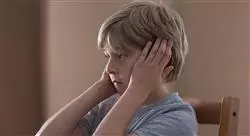
Certificate
The world's largest faculty of psychology”
Description
Make the most of the opportunity to update your knowledge in Child and Adolescent Psychopathology through classical methods to improve your patient care”
This course is unique in that it takes into account the simulation or objective dispersion of the subject with the facts. Teaching and resolving the psychologist's doubts about the accuracy of the psychodiagnostic test.
In this course the psychologist will find a whole arsenal of procedures that will teach them to use the different tests in an effective and approved way according to current scientific criteria.
Update your knowledge through the postgraduate certificate in Child and Adolescent Psychopathology in a practical way and adapted to your needs”
This postgraduate certificate in Child and Adolescent Psychopathology contains the most complete and up-to-date scientific program on the market. The most important features of the program include:
- Clinical cases presented by experts in psychology. The graphic, schematic, and eminently practical contents with which they are created provide scientific and practical information on the disciplines that are essential for professional practice
- The latest diagnostic and therapeutic information on how to approach Child and Adolescent Psychopathology
- An algorithm-based interactive learning system for decision-making in the clinical situations presented throughout the course
- With special emphasis on evidence-based psychology and research methodologies in psychology
- Content that is accessible from any fixed or portable device with an Internet connection
This postgraduate certificate may be the best investment you can make when choosing a refresher program for two reasons: in addition to updating your knowledge in Child and Adolescent Psychopathology, you will obtain a qualification from TECH Technological University"
Forming part of the teaching staff is a group of professionals in the world of psychology who bring to this course their work experience, as well as a group of renowned specialists, recognised by esteemed scientific communities.
The multimedia content developed with the latest educational technology will provide the professional with situated and contextual learning, i.e., a simulated environment that will provide an immersive training program to train in real situations.
This program is designed around Problem Based Learning, whereby the physician must try to solve the different professional practice situations that arise during the course. For this reason, you will be assisted by an innovative, interactive video system created by renowned and experienced experts in the field of psychology with extensive teaching experience.
The postgraduate certificate includes real clinical cases and exercises to bring the course closer to the psychologist's clinical practice"
Objectives
The program's primary objective is focused on theoretical and practical learning, so that the nutritionist is able to master Child and Adolescent Psychopathology in both a practical and rigorous manner.
This refresher program will generate a sense of confidence when practising psychology which will help you grow both personally and professionally”
General Objectives
- Master psychodiagnosis and evaluation in the child and adolescent framework
- Master the technique for interviewing a child or adolescent
- Master the personality evaluation of these age groups
- Identify the role of the family in child and adolescent diagnosis
- Describe the intervention of clinical psychology in these age groups
- Develop sufficient skills to manage a child and adolescent clinic
Specific Objectives
- Identify, differentiate and diagnose the new and different forms of psychological illnesses in childhood and adolescence in the current day
- Deal with the diagnosis and the setting in these ages in a conducive way
- Develop techniques to achieve the motivation and active participation of a child or adolescent patient in the diagnosis and intervention process
- Gain the knowledge necessary for establishing a patient intervention with assurance, without disregarding the involvement of the family, the school or the peer group
- Develop knowledge of different mental disorders and behavioural or emotional abnormalities
- Make a realistic prognosis of the child's or adolescent’s situation as part of the differential diagnosis
- Understand the different masks used and atypical ways the illness can present itself in children and adolescents
- Master the use of decision trees based on DSM-5 and CIE-10
- Provide knowledge and skills that help to avoid iatrogenic involvement with the patient's problem
- Learn how to design an intervention from the creativity and experience as a clinician, adapting to what is happening at each moment
Make the most of the opportunity and take the step to get up to date on the latest developments in Child and Adolescent Psychopathology"
Postgraduate Certificate in Child and Adolescent Psychopathology
The constant appearance of new models of psychological intervention, the emergence of new psycho-diagnostic methodologies and the continuous implementation of new alternatives of therapeutic approach highlight the psychology of child and adolescent care as one of the fields of greatest progress and evolution in recent years. This situation has generated a growing interest, among professionals specialized in the field, in the search and approach of academic updating plans that allow an adequate immersion to the new possibilities of the sector. Understanding this fact, in TECH Technological University we have designed our Postgraduate Certificate in Child and Adolescent Psychopathology, focused on the knowledge of the new alternatives of psychological care applied in the care of patients with psychotic disorders. Similarly, this postgraduate course will deepen the professional update on the following topics: the aspects to be considered in the advancement of a process of psychological intervention in cases of addiction to smoking; and knowledge of the different modes of care and management of patients with conditions corresponding to cases of narcolepsy.
Study an online postgraduate course in Child and Adolescent Psychopathology
Due to the neurological, social and behavioral particularities of the patients to be treated, child and adolescent psychopathological care presents great challenges to specialized professionals. In our program you will acquire the knowledge, abilities, tools, skills and knowledge necessary for the adequate resolution of the difficulties, disadvantages, challenges and unknowns that accompany the development of this area. In addition, in this postgraduate program you will delve into the modernization of the following aspects: the different intervention methodologies applicable to the management of cases of eating disorders; and the new models of care used in the management of patients with social anxiety disorder.










